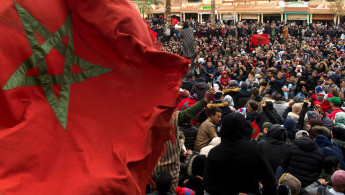Morocco's crackdown on deadly mining shafts reveals lack of alternative development investment
Jerada was the focus of international coverage last year when two brothers died mining in unauthorised shafts. The government promised reforms to contain the anger, but on-the-ground results have been few. Jerada has become known as "the town of orphans and widows".
Few mine-workers here make it to the age of retirement due to chronic diseases such as silicosis. However, the risks involved in this industry have been the only way for many to make a living and support their families.
According to several sources, young people here work under extremely dire conditions when mining coal. Candles are the only light available and a shaft collapse is always feared. The government has argued that the only solution is to shut down these resources, saying production costs are too high.
Twitter Post
|
Poverty and the lack of job opportunities remain problems across the kingdom.
While the Jerada crisis and Rif protests have provided clear evidence that Morocco still needs foreign investment to revive the mining industry, especially considering the discovery and expoitation of resources that began during the era of French colonisation. A deeper understanding of the problem lies in listening to the people of these crisis-hit areas.
The net worth of local coal production reached $1 billion in 2017, according to hespress. But as of March 2018, Morocco was ranked first for direct foreign investments in Africa. The ranking set the ground for a comeback at the African Union, but the impoverished towns remain left behind.
Jerada and Alhouceima are living examples of the continuing need for further economic development.
These small, isolated regions do not have the same economic or political clout of the major cities. They do not wield much power or yield large voting blocs for the major political parties. But a continued lack of investment in these areas is likely only to lead to further unrest, which may yet rock the balance of power in Rabat.
Habibulah Mohamed Lamin is a journalist formerly based in the Western Sahara refugee camps in Tindouf, Algeria. He has worked as a translator and is director of Equipe Media Branch, a group of media activists covering Western Sahara. His work focuses on the politics and culture of the Maghreb.
Follow him on Twitter: @habibullahWS


![President Pezeshkian has denounced Israel's attacks on Lebanon [Getty]](/sites/default/files/styles/image_684x385/public/2173482924.jpeg?h=a5f2f23a&itok=q3evVtko)



 Follow the Middle East's top stories in English at The New Arab on Google News
Follow the Middle East's top stories in English at The New Arab on Google News


